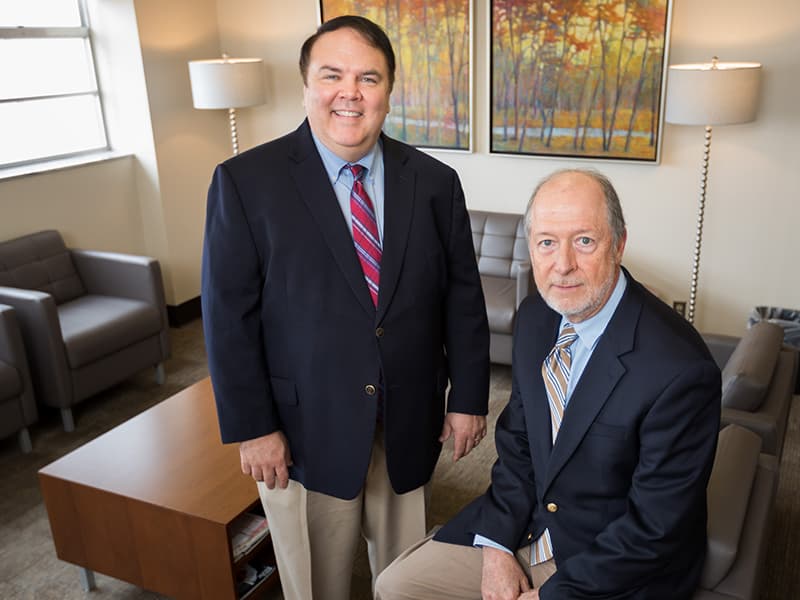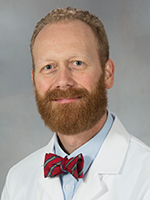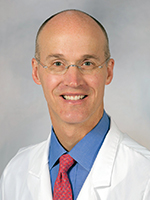Alcohol assessment treatment averts severe drinking problems

It’s not just those with severe drinking problems who need medical interventions that can turn their lives around.
A new alcohol assessment and treatment service offered by the University of Mississippi Medical Center’s Department of Psychiatry and Human Behavior is initially seeing patients with low-level or moderate problems. It’s a first step toward building comprehensive addiction services at UMMC, said Dr. Jefferson Parker, associate professor of psychiatry.
“We have chosen to start with a focus on mild to moderate alcohol problems because the base rates are so high, and because we have excellent treatments available,” said Parker, a clinical psychologist. “There are few professional treatment services for those with the most potential for a successful treatment outcome.
“Our goal is to help individuals prevent any future drinking-related problems in health, work life and relationships. The earlier you identify the problem, the higher the chances you can intervene successfully,” he said. “The treatment interventions at the lower levels are much less expensive and interfere less with a patient’s daily life than inpatient treatment for those with severe problems.”

UMMC’s holistic approach to giving patients a path to freedom from alcohol comes at a time when the Mississippi Department of Health reports that excessive drinking has consequences for virtually every part of the human body.
In its 2016 Mississippi Behavioral Risk Factor Surveillance System Annual Prevalence Report, the department says that not just people who binge drink, but those who drink relatively small amounts of alcoholic beverages “may contribute to alcohol-related death and injury in occupational incidents, especially if they drink before operating a vehicle.”

There’s a gap between treatment of individuals with severe drinking problems and those whose problems haven’t gotten to that level, said Dr. Daniel Williams, a clinical psychologist and associate professor who previously directed substance abuse services at the G.V. “Sonny” Montgomery Veterans Affairs Medical Center in Jackson.
The new program targets those whose use of alcohol is risky or harmful to the point that the person experiences one or more personal problems related to drinking, he said. Examples would be a first DUI, concerns voiced by family, or an employer noticing the person has alcohol on their breath.
The program employs a number of treatments, including:
- An interdisciplinary approach that combines the expertise of psychiatry, psychology and social work
- Standardized assessment measures
- Interventions to enhance motivation
- Education about alcohol, its effects, and available treatment goals and approaches
- Cognitive and behavioral therapy
- Evaluation by a psychiatrist to see if medication can support the person’s effort to stop drinking
- Referrals to other treatment settings, if necessary

Care will be delivered by a four-person team that has more than 30 years’ combined experience in treating substance abuse problems. Members also include Dr. Mark Ladner, a psychiatrist and associate professor who serves as director of outpatient mental health services; and Gabie Brown, a licensed clinical social worker. Parker is former chief of mental health and director of substance abuse services at the VA Medical Center in Jackson.
Therapists don’t assign labels to patients that describe how much or how often they drink. “Instead, it’s more focused on ‘Let’s look at how your drinking is making your life harder, and making you act in ways that go against your own values,’’’ Parker said. “This treatment is driven by the patient’s own motivation to remind themselves of what’s important to them. It focuses on how drinking affects your life, your health, your finances, your legal problems and your spirituality.”
During a series of clinic visits that taper off with time, the team helps the patient become aware of his problems. “We’re trying to recruit the person’s own motivation for change,” Parker said. “Instead of telling them they must change, we want them to tell their therapist that they want to change.”
“We listen to the patient’s story to get a full understanding of the individual’s situation,” Williams said. “We create personalized interventions based on best practices shown by controlled research to be effective.”
Patients also will be encouraged to take advantage online of the Rethinking Drinking program offered by the National Institutes of Alcoholism and Alcohol Abuse, Parker said.

“Building a robust and comprehensive addictions program at UMMC is of paramount importance to the state,” said Dr. Scott Rodgers, professor and chair of the Department of Psychiatry and Human Behavior. “Not only are we working to take better care of our patients, but we are also hoping to train our students and residents in evidence-based approaches to care. We want to develop a pipeline of skilled and competent providers who, upon graduation, will use our model throughout the state.”
Medical Center employees and students are the first patients being seen for treatment, with patients outside UMMC added as the program grows, Parker said. To learn more about the program, contact the department’s Behavioral Health Specialty Clinic at 601-984-5836 or email Williams at dwilliams10@umc.edu
“The earlier you can solve the problem, the more pain and suffering you can help the patient and family to avoid over time,” Parker said. “This gives them to chance to change before things really fall apart.”

